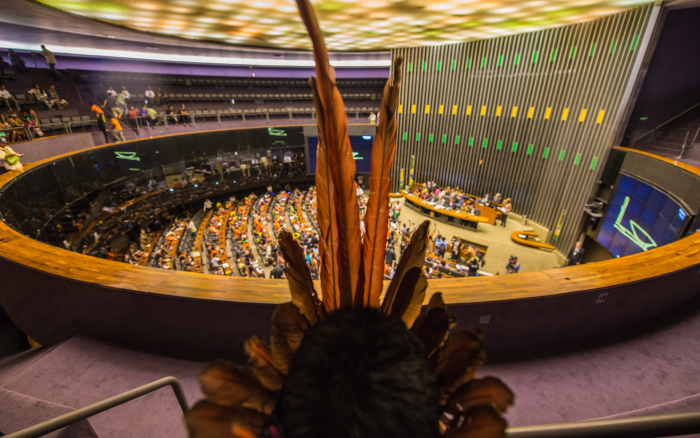Você está na versão anterior do website do ISA
Atenção
Essa é a versão antiga do site do ISA que ficou no ar até março de 2022. As informações institucionais aqui contidas podem estar desatualizadas. Acesse https://www.socioambiental.org para a versão atual.
Bolsonaro’s no-holds-barred approach to Indigenous Lands
Thursday, 13 de February de 2020 
Editorial: under the pretext of regulating the Constitution, Bolsonaro sent a bill to Congress that seeks to enable the indiscriminate exploration of natural resources on Indigenous Lands
In exceptional cases, the Constitution provides for the survey and extraction of minerals from these lands. This exceptional nature means that Congress has the exclusive competence to authorize these activities. In other areas, it is the Executive branch that authorizes the concession of mineral rights. The Constitution also establishes that a law must regulate the “specific conditions” under which these activities can occur, in addition to those already noted in the Constitution itself, such as the promotion of “national interest,” consultations with the communities affected and, if the exploration occurs, assurances that they will share in the economic returns.
However, the bill sent to Congress does not establish these specific conditions and limits itself to repeating those already provided for in the Constitution. The bill also provides for the exploration of oil and gas, the construction of hydroelectric plants and infrastructure projects that affect the soil, lakes and rivers on these lands, features set aside exclusively for use by indigenous peoples, which can only be regulated through a complementary law. In addition, the bill intends to enable wildcat mining, also by non-indigenous people, which is prohibited by the Constitution. In summary: the bill opens Indigenous Lands to any and all private interests.
The consultation of affected communities is transformed into a mere bureaucratic rite under the terms of the bill, which allows concession procedures and exploration of natural resources to continue even when not authorized by indigenous people. On this point, the bill goes beyond the interests of the companies, which would otherwise not be able to bear the factual risk, legal risk or reputational risk that a forced authorization would bring.
The obligation to hold a prior and informed consultation for indigenous peoples regarding administrative or legislative measures that affect them, guaranteed under Convention 169 of the International Labor Organization (ILO), is not even mentioned. The proposal ignores the right to a veto by indigenous people provided explicitly in the American and United Nations Declarations on the Rights of Indigenous Peoples, documents that bind all countries that are part of the UN and OAS systems. In these documents, veto is translated using the word “consent,” which must be free and informed, obtained prior to the approval of any project that affects the Indigenous Lands and their resources, especially with regard to the development, use or exploration of mineral, water or other resources. It would be nice if the administration would take seriously the guarantees that endow the country with some veneer of civilization, especially if Brazil intends to convey the credibility needed to be part of the select group that is the OECD and intends to effectively conclude a free trade agreement with the European Union.
Bill defends non-indigenous interests
When announcing the bill to Congress, Bolsonaro spoke about economic development for the indigenous peoples, but the bill actually addresses the economic access of non-indigenous people to the natural resources on Indigenous Lands. Throughout the country, indigenous communities pursue their own economic activities, generating surpluses and selling them, as they are able and willing. The administration does not even have a survey of these activities, of their production and the needs of communities that should underpin suitable public policies. For example, the indigenous peoples cannot use their lands, which belong to the union, as collateral for lines of public or private credit. But the bill does not address these needs, and does not support the real work of indigenous peoples, relegating them to the level of royalty recipients.
The arrival of the bill coincides with the return of the demarcation cases of Indigenous Lands from the Ministry of Justice to the National Indian Foundation (Funai): due to the characterization by Funai itself that the communities that live on lands yet to be demarcated are invaders, excluding them, also, from welfare programs; due to the appointment of a fundamentalist missionary to head the foundation’s Department of Isolated Indigenous Peoples; and due to declarations by Bolsonaro himself about indigenous people who “are evolving” into “humans like us.”
Expropriation of assets and indigenous rights
Make no mistake: what the administration is proposing is total expropriation of the assets and rights of indigenous peoples enshrined in the Constitution and civil progress. This affects not only indigenous peoples, but all Brazilians that value ethnic and cultural diversity, the great competitive advantage that marks our history as a people and country, and that also depends on indigenous land for the maintenance of fundamental ecosystem services, such as climate regulation, the maintenance and quality of water sources, the continuity of agricultural productivity, etc.
It is pointless for diplomats and economic ministers to say that Brazil is committed to sustainable development and to facing climate change, when it is the president himself who professes prejudice, discrimination, hate for indigenous peoples and predatory rage for their lands.
Hot potato with Rodrigo Maia
The hot potato is now in the hands of the President of the Chamber of Deputies, Rodrigo Maia. Last year, he had promised the indigenous peoples, in a hearing, that no vote would be held on a proposal that infringed upon indigenous rights, but as soon as he received a message from the executive, he formed a provisory committee without consulting the Parliamentary Front in Defense of Indigenous Rights. No one knows why. The extent of the impact of the bill on indigenous lands and peoples, contributing to escalating deforestation, the destruction of rivers and rising conflicts in the Amazon and in other regions, warrants caution from Rodrigo Maia that the executive does not possess.
ISA
Imagens:



